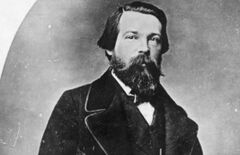Friedrich Engels
( author, socialist) | |
|---|---|
 | |
| Born | 28 November 1820 Barmen, Prussia |
| Died | 1895-08-05 (Age 74) London, England |
| Nationality | German |
| Alma mater | University of Berlin |
Friedrich Engels, anglicised as Frederick Engels, was a 19th century author and socialist whose writings continue to inform the struggles and inspire the hopes that define our own crisis-ridden age.
Tribute
Few political and intellectual partnerships can rival that of Karl Marx and Friedrich Engels. They not only famously coauthored the "Communist Manifesto" in 1848, both taking part in the social revolutions of that year, but also two earlier works – "The Holy Family" in 1845 and "The German Ideology" in 1846.
In the late 1870s, when the two scientific socialists were finally able to live in close proximity and to confer with each other every day, they would often pace up and down in Marx’s study, each on their own side of the room, boring grooves in the floor as they turned on their heels, while discussing their various ideas, plans, and projects.
They frequently read to each other passages from their works in progress. Engels read the entire manuscript of his "Anti-Dühring" (to which Marx contributed a chapter) to Marx before its publication. Marx wrote an introduction to Engels’s "Socialism: Utopian and Scientific". After Marx’s death in 1883, Engels prepared volumes two and three of "Capital" for publication from the drafts his friend had left behind. If Engels, as he was the first to admit, stood in Marx’s shadow, he was nevertheless an intellectual and political giant in his own right.[1]
Quotes
“the state is nothing but a machine for the oppression of one class by another, and indeed in the democratic republic no less than in the monarchy [...] until such time as a new generation, reared in new and free social conditions, will be able to throw the entire lumber of the state on the scrap-heap.”
Friedrich Engels [2]
“You have destroyed the small monopolies so that the one great basic monopoly, property, may function the more freely and unrestrictedly. You have civilised the ends of the earth to win new terrain for the deployment of your vile avarice. You have brought about the fraternisation of the peoples – but the fraternity is the fraternity of thieves.”
Friedrich Engels [3]
“By dissolving nationalities, the liberal economic system had done its best to universalise enmity, to transform mankind into a horde of ravenous beasts (for what else are competitors?) who devour one another just because each has identical interests with all the others – after this preparatory work there remained but one step to take before the goal was reached, the dissolution of the family. To accomplish this, economy’s own beautiful invention, the factory system, came to its aid.”
Friedrich Engels [3]
“The bourgeoisie has gained a monopoly of all means of existence in the broadest sense of the word. What the proletarian needs, he can obtain only from this bourgeoisie, which is protected in its monopoly by the power of the state. The proletarian is, therefore, in law and in fact, the slave of the bourgeoisie, which can decree his life or death.”
Friedrich Engels [4]
“Everywhere the proletariat develops in step with the bourgeoisie. In proportion, as the bourgeoisie grows in wealth, the proletariat grows in numbers.”
Friedrich Engels [5]
References
- ↑ "Friedrich Engels at 200"
- ↑ https://www.marxists.org/archive/marx/works/subject/hist-mat/civ-war-intro.htm
- ↑ Jump up to: a b Outlines of a Critique of Political Economy (1844)
- ↑ The Condition of the Working Class in England in 1844 (page 112)
- ↑ Principles of Communism (1847)